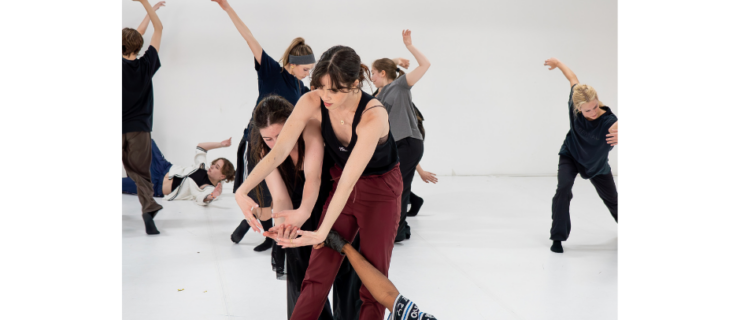Wally Cardona's Ridiculous Bliss
Tool Is Loot
at The Kitchen seemed to be supremely perverse, but I was less interested in the piece itself and more interested in the two choreographers—Wally Cardona and Jennifer Lacey—as performers.
I say perverse because it was a duet in which the two hardly ever danced together, and because it was made with input from people who had no experience in dance. (See our Sept. “New York Notebook.”) Even after trying to rid themselves of their creative habits by calling in such people, Cardona and Lacey were very much themselves—and I’m glad. They both embody this quote by Merce Cunningham: “I think dance only comes alive when it gets awkward again.”
Although Lacey is an interestingly sly performer, especially in how outrageously, um, tactile she can be with objects, it was Cardona’s dancing that grabbed me. Vivid, thought provoking, and even giddy-making, he indulges in his own idiosyncrasies like some precocious child. I had seen him perform in his own work as sort of a catalyst who makes surprises happen both architecturally and interaction-wise. But this time his own dancing captured my attention completely. He performed as though he were in a room by himself, remembering, forgetting. In one passage, his hand got stuck inside his shirt (on his heart?) while he was otherwise occupied. And then, the hand sprang out of his shirt, suddenly looking like a foreign object to him.
Wally Cardona in
Tool Is Loot. Photo by Paula Court, Courtesy The Kitchen.
He took many little sidesteps on tiptoe with an odd combination of apology, playfulness, and keen consciousness. He knocked wrists and knees together in a sweetly abject way, as though enjoying how small he could become—always with a glint of mischief.
The intensely private nature of his dancing opened up such a field of fantasy that I was reminded of the powerfully projected imagination of the late butoh master Kazuo Ohno. Like Ohno, Cardona seemed entranced by his own gestures (at times paw-like, at times alarmingly agitated), and like Ohno, he embodied both female and male.
Cardona also has a quality that reminds me of Steve Paxton: The more he burrows into his own imagination, the more kinetically alive he becomes. Early in the piece we hear Lacey’s recorded voice tell a story about a prince enjoying the touch of a mustachio-ed man’s lips on his body and then seeing the stars. At the end, we hear the sound of Jonathan Bepler’s crazily cracking falsetto voice making its way through the same story while Cardona cavorts around the space—and it’s a bit of heaven.




